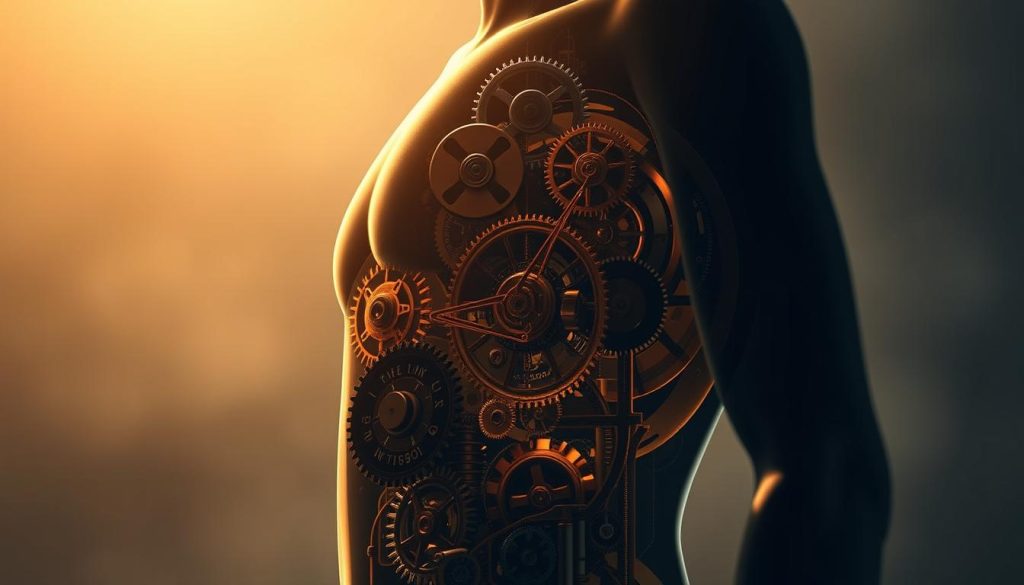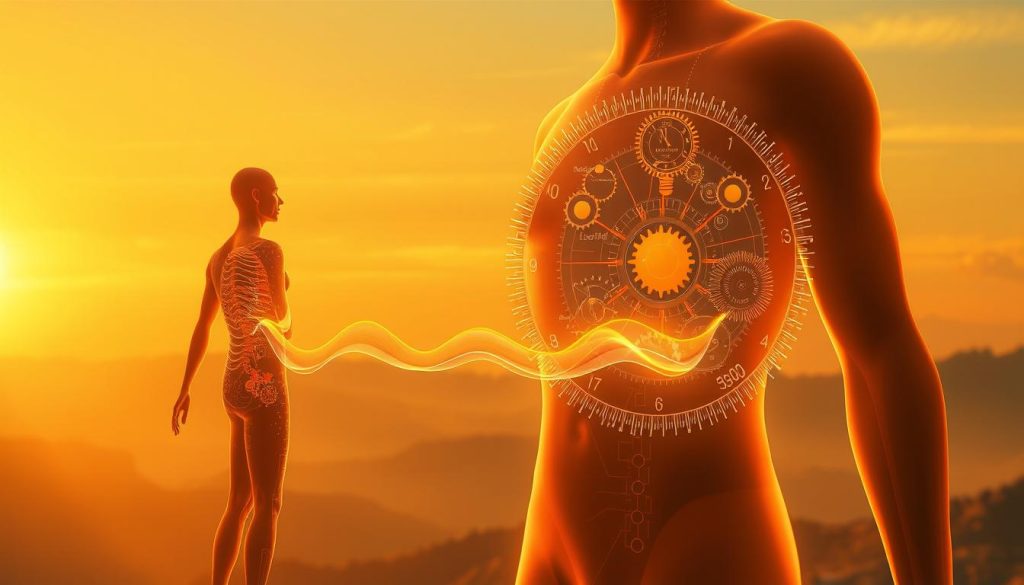It’s key to understand how our circadian rhythm affects our metabolism. This internal clock controls our energy use, from sleeping to waking. It makes sure our body’s functions work best at the right times.
Studies show our internal clocks are crucial for our body’s rhythm. A study in Cell Metabolism looked at how our clocks influence our metabolism. Harvard Medical School also stresses the importance of our internal clocks for health and energy.
The Science Behind Circadian Rhythms
Circadian rhythms are 24-hour cycles that control physiological processes in living things. They are not random but are controlled by a biological clock in the brain’s SCN. This clock keeps our daily rhythms in sync with the Earth’s rotation.
Genes are key in setting these cycles. Studies show proteins like CLOCK and BMAL1 are crucial for our biological clock. They help manage gene activity, affecting our physiological processes.
Light exposure also affects our circadian rhythms. ScienceDaily explains that light signals the SCN, adjusting our sleep, wake, and hormone cycles. This ensures our physiological processes match environmental changes, boosting health and performance.
Research in Science highlights the genetic side of daily rhythms. Genes like PER and CRY work with CLOCK and BMAL1 to time our biological activities. Knowing this can help us improve our well-being by working with our natural cycles.
How Biological Clocks Regulate Daily Rhythms
Our body’s internal clock is key to keeping us healthy. It controls when we sleep, eat, and release hormones. Knowing how it works helps us stay well.
At the heart of this are clock genes, studied in the Journal of Biological Rhythms. These genes link our internal clock to the outside world. The National Institute of Health (NIH) says our body’s systems, like the heart and digestion, follow these clocks.

Chronobiology International has done deep research on our internal clock and the environment. This ensures our body’s rhythms stay in sync. This is crucial for good sleep, eating, and hormone balance.
Our biological clocks are very important. When they work right, we feel better and function better. But if they’re off, we can get sick. Here’s why.
| Factor | Importance | Impacts |
|---|---|---|
| Sleeping | Aligns with internal clock | Improved cognitive function |
| Eating | Controlled by temporal regulation | Optimized metabolism |
| Hormone Release | Synchronized with biological rhythms | Balanced energy levels |
Following our natural schedule helps our body’s systems work better. This leads to a healthier, more balanced life.
The Connection Between Circadian Rhythm and Metabolism
The link between our body’s internal clock and metabolism is very important. Our internal clock controls when we sleep and wake up. It also affects how our body processes food and energy. When our internal clock is off, it can harm our metabolic health.
How the Sleep-Wake Cycle Affects Metabolic Processes
Our sleep-wake cycle is key to our circadian rhythm. Studies in the Journal of Sleep Research show how sleep issues can mess with our metabolism. When we don’t sleep right, our body’s way of handling sugar and energy gets worse.
This can raise the chance of getting type 2 diabetes and obesity.
The Role of Hormones in Metabolism Regulation
Hormones, which follow our internal clock, help control how we metabolize. The Endocrine Society says hormones like cortisol and melatonin are vital. Cortisol helps us wake up in the morning, while melatonin helps us sleep at night.
Research in Nature Communications found that hormonal problems from a bad internal clock can mess up our metabolism. This can lead to metabolic disorders.
The Impact of Internal Clocks on Health
Our internal clock, or circadian rhythm, is key to our health. It controls sleep and affects how we use energy. If it’s off, we can face health problems. So, knowing its role is important.
Circadian Rhythms and Energy Balance
Circadian rhythms affect our energy levels. When they’re in sync, we eat and move better. This helps us stay healthy. A study in the Annual Review of Nutrition shows that rhythm problems can cause metabolic issues.

Following a regular eating and exercise schedule helps. It keeps our energy balance in check. This can help us manage weight and lower disease risks.
Chronobiology: The Study of Biological Rhythms
Chronobiology studies our biological rhythms. A Journal of Chronobiology International review says it looks at how these rhythms impact us. It shows how important they are for our health.
Research, like in The Lancet, shows rhythm problems harm our health. They can cause obesity, diabetes, heart disease, and mental health issues. Keeping our internal clock in check is vital for our well-being.
Circadian Disruption: Causes and Consequences
Circadian disruption means our natural daily rhythms are off. This can really affect our health. It’s important to know why this happens and how it impacts us.
Common Causes of Circadian Disruption
Many things can mess with our natural rhythms. The Sleep Foundation says lifestyle choices like irregular sleep and too much caffeine can do it. Also, too much screen time before bed and artificial light at night play a part.
Health Impacts of Disrupting Circadian Rhythms
Disrupting our natural rhythms can harm our health a lot. Sleep Medicine Reviews found it can cause sleep disorders like insomnia. It can also lead to obesity, diabetes, and heart disease over time.
The Centers for Disease Control and Prevention (CDC) warns about shift work. Workers on non-traditional schedules often face health problems. Trying to get back in sync with our natural rhythms can help us feel better.
Strategies to Maintain a Healthy Circadian Rhythm
To keep your circadian rhythm healthy, make lifestyle changes. These changes help your body clock stay in sync with nature. Simple habits can greatly improve your circadian health.
Good sleep hygiene is key. A Harvard Health article says a regular sleep schedule is essential. Go to bed and wake up at the same time every day, even on weekends. Your body likes routine.

Getting enough daylight is also important. The National Sleep Foundation says natural light in the morning is crucial. It helps reset your body clock, improving your circadian health.
Timing your activities, like eating and exercising, also helps. The Journal of Clinical Sleep Medicine notes that doing these at the right times can help your body clock. It links them with when you’re most alert and energetic.
In summary, making these lifestyle changes can align your biological clock with your daily life. This improves your overall well-being and keeps your circadian health strong.
The Effects of Diet on Circadian Metabolism
Understanding how diet affects our circadian metabolism is key to good health. What we eat and when we eat impacts our internal clocks. Eating in sync with our body’s natural rhythms can improve our health and well-being.
Best Foods for Supporting Circadian Health
Studies show certain foods can help our circadian rhythms. Foods like complex carbs, lean proteins, and healthy fats give us energy all day. Adding fermented foods and antioxidants also boosts our circadian health.
- Complex Carbohydrates: Whole grains, sweet potatoes, and legumes.
- Lean Proteins: Chicken, turkey, tofu, and lentils.
- Healthy Fats: Avocados, nuts, and olive oil.
- Fermented Foods: Yogurt, kimchi, and sauerkraut.
- Antioxidant-Rich Foods: Berries, dark leafy greens, and bell peppers.
A study in the Nutrients journal talks about the benefits of time-restricted eating. Eating within a 10-12 hour window helps our body’s natural rhythms. It aids digestion and keeps our energy levels steady, preventing metabolic disruptions.
| Food Category | Examples | Benefits |
|---|---|---|
| Complex Carbohydrates | Whole grains, sweet potatoes, legumes | Steady energy release |
| Lean Proteins | Chicken, turkey, tofu, lentils | Muscle repair and growth |
| Healthy Fats | Avocados, nuts, olive oil | Brain health, satiety |
| Fermented Foods | Yogurt, kimchi, sauerkraut | Improved digestion |
| Antioxidant-Rich Foods | Berries, dark leafy greens, bell peppers | Reduced inflammation |
In an interview with Today’s Dietitian, nutritionists stressed the importance of regular meals. They also talked about eating foods that support our circadian rhythm. By focusing on nutrition that aids our circadian health, we can keep our biological clocks in balance.
Exercise and Its Influence on Circadian Rhythm
Regular exercise boosts health and affects our circadian rhythm. Working out at the right time can make exercise more effective. This improves our overall well-being.
Timing Your Workouts for Optimal Metabolism
A study in the International Journal of Sports Medicine found that when we work out matters. Morning or late afternoon exercises are best for our natural rhythms.
Exercising in the morning can reset our internal clock, leading to better sleep and balance. The American Council on Exercise also notes that timing workouts right can help manage weight and boost energy.
Understanding how exercise timing affects our circadian rhythms can change our routines. Here’s a simple guide to match your workouts with your body’s natural rhythm:
- Early Morning: Great for boosting alertness and jumpstarting metabolism.
- Late Afternoon: Ideal for peak performance and strength training due to higher body temperature.
- Evening: Best for relaxation-based activities like yoga to prepare the body for sleep.
Use these tips to get the most out of your workouts and stay in sync with your body’s natural rhythm.
The Role of Light Exposure in Regulating Circadian Rhythms
Light plays a key role in keeping our circadian rhythms healthy. During the day, natural light helps our internal clock stay in sync with the outside world. It affects our sleep patterns by controlling melatonin, the hormone that helps us sleep and wake.
A study in the Sleep Health Journal shows that enough light during the day can improve sleep. It also points out that avoiding light in the evening is important. This helps our bodies make more melatonin, leading to better sleep.
The National Institute of Environmental Health Sciences says our bodies are very sensitive to light. This means both natural and artificial light can greatly affect our sleep and our internal clocks.
The Journal of Clinical Sleep Medicine found that light in the evening can mess up our sleep and our body’s rhythm. This can harm our health and well-being.
| Time of Day | Recommended Light Exposure | Effects on Circadian Rhythm |
|---|---|---|
| Morning | High Natural Light | Boosts Alertness and Sets Daily Rhythm |
| Afternoon | Moderate Natural Light | Maintains Energy Levels |
| Evening | Low Light | Prepares for Sleep; Enhances Melatonin Production |
The Future of Chrononutrition: Eating by the Clock
Chrononutrition is changing how we see diet and meal timing. It matches our eating with our natural body rhythms. This can boost our metabolic health and overall well-being.
This new way in dietary science promises to bring in fresh strategies for eating. It could change how we keep our metabolism healthy.
Innovative Approaches to Time-Based Eating
Chrononutrition focuses on eating at the right times for our body. Eating big meals when it’s light out can help our metabolism. This is because our body is most active then.
There are methods like intermittent fasting and early time-restricted feeding. These limit when we eat. Research shows they help with weight and metabolic health.
Potential Benefits of Chrononutrition on Metabolism
Chrononutrition isn’t just a trend; it’s backed by science. Studies in Current Opinion in Clinical Nutrition & Metabolic Care and Annual Review of Nutrition show its benefits. These include better insulin sensitivity and glucose control.
It also improves our lipid profiles. Here’s a table of some benefits:
| Chrononutrition Practice | Metabolic Benefit |
|---|---|
| Early Time-Restricted Feeding | Improves glycemic control |
| Intermittent Fasting | Enhances fat metabolism |
| Caloric Intake Synchronization | Minimizes insulin resistance |
As more people align their eating with their body clocks, chrononutrition could greatly improve health. It focuses on metabolic health, making it key to a healthier lifestyle.
Real-Life Examples of Circadian Rhythm Optimization
Optimizing circadian rhythms can greatly improve health and happiness. The National Institute of Health (NIH) shares a story of someone who got better health by aligning their body’s clock. They changed their sleep, meal times, and light exposure.
This led to more energy and a better mood. It shows how important it is to match our daily routines with our natural rhythms.
Science also backs up the benefits of circadian optimization. A study in Sleep Medicine shows how lifestyle changes can help with sleep disorders. People who stuck to regular sleep times, ate on schedule, and exercised felt better.
They saw less insomnia and seasonal affective disorder (SAD). This proves that improving our daily rhythms is key for our health.
Psychology Today also shares personal stories of improving circadian rhythms. People talk about how changing their light, food, and exercise habits helped. They slept better, focused more, and felt happier.
These stories and studies show that living in sync with our body’s clock can make a big difference in our health.

